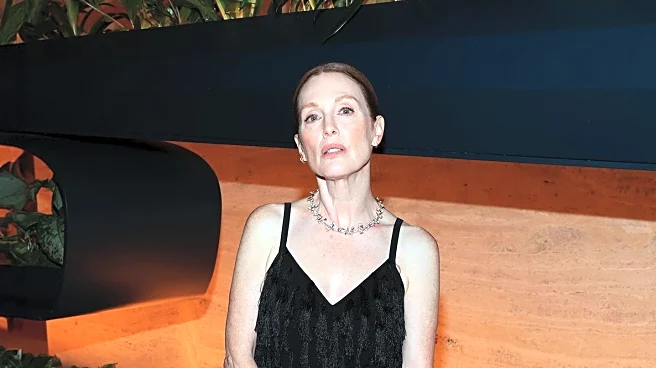What's Happening?
Louise Trotter, the newly appointed designer at Bottega Veneta, presented her first collection for the Italian luxury label during Milan Fashion Week. The show, held at the Piazzale Lodi area, was marked by a sparse set design featuring stools made of gummy colored Murano glass, allowing attendees to focus on the clothes. Trotter's collection emphasized the brand's artisanal roots, showcasing shoes, bags, and clothing with intricate craftsmanship. The collection included statement outerwear and tactile skirts, with designs that act like sculptures, maintaining a graceful distance from the body. Trotter's approach reflects a shift towards dressing for the 'female gaze,' a concept gaining traction in fashion, highlighting the need for female perspectives in an industry dominated by male executives.
Why It's Important?
Trotter's debut at Bottega Veneta is significant as it underscores the scarcity of female designers in high-end luxury fashion. Her appointment comes at a time when the industry is increasingly recognizing the importance of diverse perspectives. Bottega Veneta, known for its resilience amid global economic challenges, aims to leverage Trotter's unique vision to maintain its competitive edge. Her focus on craftsmanship and subtle branding aligns with the brand's identity, potentially attracting a broader audience, including stylish men. This shift could influence other luxury brands to prioritize female leadership and diverse design perspectives, impacting industry standards and consumer expectations.
What's Next?
As Trotter continues to shape Bottega Veneta's creative direction, her influence on the brand's sales and market positioning will be closely watched. The luxury fashion industry may see increased demand for designs that cater to the female gaze, prompting other brands to reevaluate their leadership and design strategies. Trotter's success could inspire more women to pursue executive roles in fashion, gradually altering the industry's gender dynamics. Additionally, Bottega Veneta's focus on craftsmanship and subtle branding may set a trend for other luxury labels seeking to differentiate themselves in a competitive market.
Beyond the Headlines
Trotter's debut collection not only highlights the importance of female perspectives in fashion but also raises questions about the industry's gender imbalance. Her approach to design, treating the body as a canvas, challenges traditional notions of fashion, promoting a more inclusive and diverse representation. This shift could lead to broader cultural changes, encouraging consumers to value authenticity and craftsmanship over conspicuous branding. As the industry evolves, ethical considerations regarding representation and diversity may become central to fashion discourse, influencing both design practices and consumer behavior.









